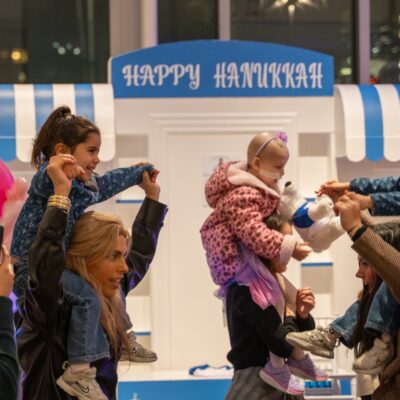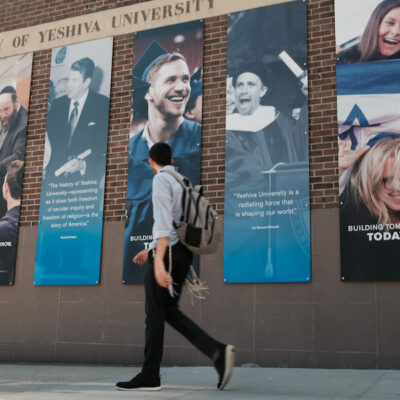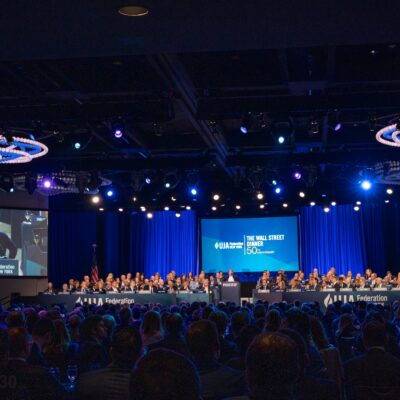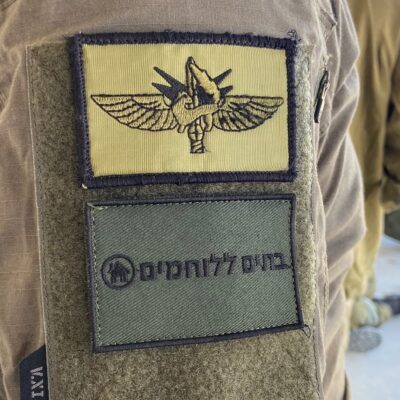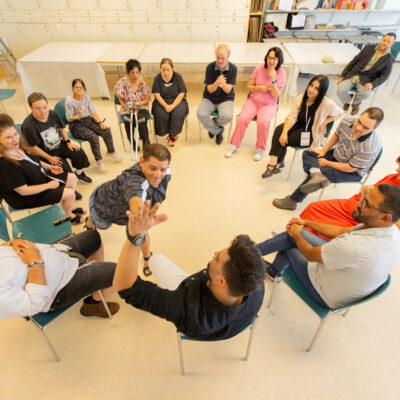Social Innovators Share Thoughts on Next Generation Jewish Engagement

Insights from a panel discussion hosted by Jewish Community Foundation of Los Angeles
On a recent evening, the Jewish Community Foundation of Los Angeles (The Foundation) hosted donors and friends for a panel discussion on next-generation engagement. This universal topic is front of mind with Jewish leaders striving to create pathways of inclusion and connectivity to Judaism for “Gen X” and millennials.
The four panelists – Jewish innovators who conceived or lead initiatives that focus on reanimating and creating these connections in visionary ways – included: Jordan Fruchtman, chief program officer, Moishe House; Aaron Henne, artistic director, Theatre Dybbuk; Ayana Morse, executive director, Silverlake Independent Jewish Community Center; Ronit Tsadok, associate rabbi of IKAR. The dialogue was moderated by Elana Wien, director of The Foundation’s Center for Designed Philanthropy.
Moishe House, which now has 93 locations in 21 countries, provides subsidized housing for post-college-age Jews in return for leading creative programming in communal spaces. Theatre Dybbuk uses Jewish history, folklore and rituals as the platform for creating connection. Silverlake Independent Jewish Community Center, most notably its East Side Jews collective, serves as a hub for a re-emerging, eclectic Jewish life on the city’s hip east side. In conjunction with Reboot, IKAR is implementing a local Jewish iteration of “Death Over Dinner,” a series of intimate gatherings that will engage millennials in discussions about mortality and end-of-life topics.
Each organization has been a recipient of a Cutting Edge Grant from The Foundation. The multi-year grants of up to $250,000 are awarded to creative thinkers, social entrepreneurs, and innovative organizations to develop and implement transformative programs of high visibility and impact in the Los Angeles Jewish community. Since being established by The Foundation in 2006, more than $15 million in Cutting Edge Grants have been awarded to 84 programs, with a particular emphasis on initiatives to drive Jewish engagement and inclusion.
What follows are condensed, edited excerpts of the evening’s conversation.
Elana Wien (EW): How do you engage next-gen Jews?
Ayana Morse (AM): At SIJCC, and particularly with our East Side Jews collective, we highlight values and feelings rather than defining a particular age bracket. There is an energy in our events that is palpable, driven by creativity, arts and culture, that fuse together to create something that feels fresh and relevant. Our model of community-driven programming invites participants to work alongside our professional team to dream about and visualize what comes next.
Ronit Tsadok (RT): Through this Jewish version of “Death Over Dinner,” we will enable many next gen Jews to participate in meaningful dinner table conversations contemplating mortality, end-of-life, and other spiritual questions. These conversations are often surprising and somehow life affirming. We’re helping people connect to a topic our tradition addresses particularly well, and that many people are already interested in discussing, but don’t know where to start.
EW: Funders are focused on funding the innovative but many of your programs incorporate aspects from existing models. What about your projects are innovative vs. iterative/rediscovering, where’s the line, and how do the two intersect?
Jordan Fruchtman (JF): Moishe House started out as quite innovative because none of us had prior experience as Jewish professionals. My co-founders and I were simply young, inspired recent college graduates who saw and felt a need – based on our own lives. Presently, I would say we are in a mixed phase between innovation and familiarity. In terms of innovation, we have a bucket in our strategic plan directly related to experimenting with new big ideas at Moishe House.
The process is also continuous and drives most of our innovation. We are constantly asking ourselves to improve and make changes to the existing structure. Not a year goes by that we don’t ask ourselves if we should have a national conference again, what it needs to be, and how we will meet new needs and fix old problems. We are unafraid to try new solutions, and particularly unafraid to say when something is not going well, so long as we fix the problem.
Aaron Henne (AH): Theatre is, as is religious ritual, one of our oldest forms of communal engagement. Utilizing theatrical forms to illuminate Jewish traditions, topics, and perspectives is inherently repetitive. It brings our history to life through a contemporary exploration of some of our most ancient forms. We utilize these techniques and storytelling to provide a variety of opportunities for connection: educational workshops, provocative productions, and synagogue collaborations. We are forming community by going into different communities throughout Los Angeles and serving as a binding agent for those who are seemingly disconnected from one another.
AM: For us, innovation and familiarity are constantly in conversation. The through line of our programming is reinterpreting Jewish rituals and traditions. We take something that has been at the cornerstone of Jewish life for many years and give it a contemporary twist.
RT: The “Death Over Dinner” project was already out there, and after speaking to the creator, Michael Hebb, Rabbi Sharon Brous realized how incredibly powerful it was. The initial response is often, “Who wants to talk about death, let alone over dinner?” But it turned out that thousands of people, including those in their 20s and 30s, have wanted to talk about end-of-life issues and the afterlife… about mourning and grief. IKAR and Reboot were excited to expand upon that model.
EW: What are some of the key challenges you face as a leader and what can funders and the wider community do to support you in addressing those challenges?
AH: Bandwidth and resources. We are a relatively young organization that is operating in as lean a manner as possible. We need to be mindful about how we proceed and may, at times, have to limit our availability in order to make sure that the quality remains as high as possible.
AM: When SIJCC received its $250,000 Cutting Edge Grant to establish Culture Lab, it came at a point when our community was ready for something to push us to the next place. The Culture Lab has been effective in repositioning the JCC as a compelling part of the Jewish as well as arts and cultural landscapes in the city.
EW: Funders value building and leveraging partnerships as critical to an organization’s success, but don’t always see how you are doing just that in creative and critical ways. What does collaboration look like for your organization?
JF: Twenty percent of all Moishe House programs are in partnership with another organization. In 2016, we will have over 1,000 partnered programs at Moishe Houses around the world. The key to great partnerships is an understanding of boundaries and benefits upfront. Far too often partnerships take shape solely because a funder said they would only give money if it were a partnership program. This can lead to fragile or one-sided partnerships.
AH: In the past year alone, we worked with six religious schools, two Hillels, multiple synagogues, and organizations such as Moishe House and the SIJCC. We also engaged in performance-related partnerships with Grand Park/Music Center, Temple Israel of Hollywood, and The Fowler Museum at UCLA in collaboration with the Dortort Center for Creativity in the Arts at UCLA Hillel.
EW: What is the role of mentorship in developing a leadership pipeline for young people within Jewish organizations?
JF: Mentorship is incredibly important, but right now the new buzz word and approach to development is “coaching.” We see mentorship as a long-term and very personal relationship that must be a two-way relationship. With coaching, we are talking about a process that could be done in a few sessions or over the course of a year. It can be project specific and most certainly dives into the personal aspects of professional challenges. A coach can help us get out of our own way. Moishe House has started to use executive coaches in its leadership training. We have received incredibly positive feedback so far.
AM: Opportunities for mentorship are always valuable, and finding ways to involve younger people in decision making processes is a great way to gain buy-in and support from them. Our structure is set up to include multiple engagement points from the community, from open-invitation brainstorming sessions to joining events and program committees.
EW: How can older, non-millennials find a place in your programs and projects?
AH: While our focus is “Next Gen,” our programs are open to people who have an interest in meaningful creative experiences. We provide multiple points of entry – educational workshops, holiday programming, performances and professional development – and have found that participants come from a variety of perspectives and backgrounds.
AM: Our programs tend to appeal to people who are creative, curious and seeking a deeper connection to their community and tradition. Our core audience for East Side Jews is generally in their late 20s to mid-40s, but we have a strong showing of people both older and younger. At Last Sabbath, our monthly roving supper club, it’s not uncommon to find a table of people spanning generations engaging in conversation and enjoying a meal together.
EW: How do you respond to older audiences who say, “How come I’ve never heard of you?” What are you doing to change that?
JF: First and foremost, they are hearing about us on Facebook. Yes, Facebook. The demographics continue to get older and older on Facebook as more millennials gravitate to social media platforms like Instagram, Snapchat and Twitter to communicate these days. Why? It is because their parents are populating Facebook.
We are always trying to brand ourselves better. It is happening more and more through word of mouth from our young adults, through our countless partnerships on the ground and in our communities, as well as press coverage we continue to see. Like anything, it is a work in progress.
EW: Your organizations have limited resources yet you’re willing to embrace risk. How do you balance the need for consistency with innovation, and how do you learn from those experiments that don’t work out?
AH: Coming from theatre, I take the attitude that most things are “rehearsal,” meaning that they are opportunities to experiment, to learn that which “serves the performance” and will continue to be utilized and that which doesn’t but was worth giving a try.
AM: We are not afraid of trying new things and giving them space to breathe and evolve. We also encourage our community to be involved in every step of the way, as we plan events and launch new programs, so that successes and failures are shared by all of us in a connected, meaningful way.
JF: We love a little risk. We are constantly experimenting and have a structure around our innovation so that it is tested and housed in one department at Moishe House. We have to learn to be more humble and honest about our mistakes and mess ups. We have to keep trying lots of little solutions and scrap the ones that do not work and invest in the bright spots. Software developers are mostly moving towards this agile framework for growth and Jewish organizations could gain a lot from this experience.

 Add EJP on Google
Add EJP on Google
